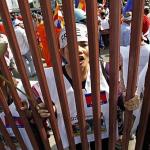Fears over human rights in Cambodia as crackdown on protests continues
https://portside.org/2014-02-10/fears-over-human-rights-cambodia-crackdown-protests-continues

Portside Date:
Author: Kevin Ponniah
Date of source:
The Guardian

Prak Sovannary tries to put on a brave face. She has just heard that two of 23 men arrested (pdf) during a violent crackdown on garment worker protests in Phnom Penh, Cambodia, last month have unexpectedly been released on bail.
Her husband, Vorn Pao, a prominent activist and union leader, is not one of them. He was beaten by soldiers shortly before undergoing surgery for kidney cancer. Pao warned his wife he was unlikely to survive in prison.
"I just don't understand this court. They already denied bail for all of the 23, but now they have suddenly released these two," she said, attempting to laugh it off. "Even if they give them all bail, they'll probably just arrest them again."
The remaining 21 could be released on bail on Tuesday, but charges against them are expected to stand.
Many believe the 23 are being used as a political tool by the government, through the kingdom's malleable court system, to intimidate protesters and push the opposition Cambodia National Rescue Party (CNRP) to end their boycott of parliament, which began after last July's disputed national elections.
After months of protests, which were largely tolerated by the government, human rights in Cambodia have deteriorated rapidly this year. A ban on public assembly has been implemented in the capital, Phnom Penh, and enforced by untrained "public order officers", who are armed with batons and electric cattle prods.
Journalists have been beaten at demonstrations and opposition gatherings have been intimidated by hordes of ruling party supporters.
Pao, whose Independent Democracy of Informal Economy Association represents some of Cambodia's poorest workers in the informal sector, was arrested with nine others, including two other activists, at a demonstration on 2 January outside a garment factory owned by Yakjin Trading, which produces clothes for brands including Gap and Banana Republic.
Videos show Pao calling for calm and trying to negotiate with an elite paratrooper brigade that had been sent to quash the demonstration. But when rocks began to fly, he was seized as a protest leader, beaten and dragged away, his crisp white shirt soaked with blood.
Trade union members demonstrate in front of the Cambodian embassy in Brussels, Belgium, to show support for jailed protesters. Photograph: Julien Warnand/EPA
Thirteen more workers and bystanders were arrested the following day, when more clashes between angry Molotov cocktail-throwing protesters and security forces spiralled out of control, leaving at least four shot dead in what rights groups called the worst state violence against civilians in 15 years.
All 23 were charged with intentional violence and property destruction. They were then held incommunicado for nearly a week, reportedly without proper medical care, in the remote prison where 21 of them remain.
"The first time I saw my husband he was just crying. He had been at the prison for a week but no friends, relatives or lawyers had come to visit him and he thought that we had all abandoned him," Sovannary says.
After an investigation, on 6 February, the Asian Human Rights Commission called for the charges to be withdrawn and the detainees released.
While young people have been heavily involved in the protests, many of the first to flood the capital were middle-aged and elderly people, often bearing specific grievances against the government of Prime Minister Hun Sen, who has ruled for 29 years.
Despite impressive economic growth, land grabs, rampant deforestation, impunity, stagnating wages and widespread corruption have long dogged Cambodia. But the resurgence of a confident and uncompromising political opposition turned what had fuelled small, disparate protests into a mass movement demanding change.
The numbers swelled when garment workers went on strike and joined the protests in late December after a hike in their minimum wage to $95 (£58) fell below their desired target of $160. The government clampdown followed, ostensibly to restore "social order".
"[The government] is now basically going back to the old days where they ruled by fear … they should remember the message from the July election … and treat the people differently, instead of oppressing and expecting that they are going to take it lying down," said Ou Virak, president at the Cambodian Centre for Human Rights.
In the past month, CNRP leaders have been summoned to court, human rights activists bundled into police vans, and "Freedom Park" – the capital's designated protest space – occupied by military police.
Rupert Abbott, Amnesty International's researcher on Cambodia, Laos and Vietnam, described the situation as a crisis. "All of together has to be seen as an orchestrated attempt to bring an end to what was an overwhelmingly peaceful movement calling for changes and greater responsibility for human rights," he added.
Global unions have announced a worldwide day of action in support of the detainees before a bail appeal hearing this week, while local unions have threatened another mass walkout.
Meanwhile, Sovannary has vowed to stay strong while lobbying for the charges against her husband – who faces up to five years in prison - to be dropped. "From my point of view, even if my husband is released, I will continue to support him to be a human rights defender … If we are still afraid of the government we will never get what we want."
